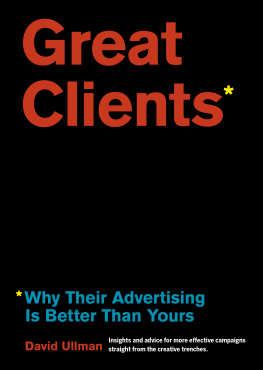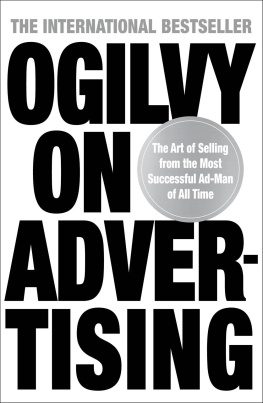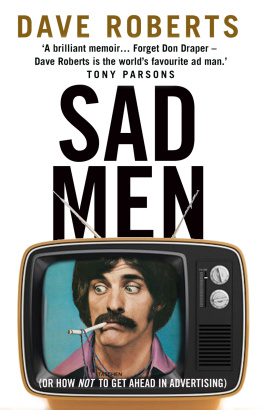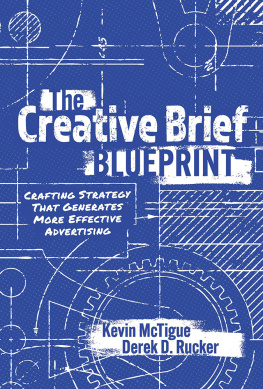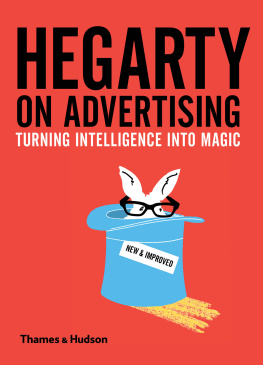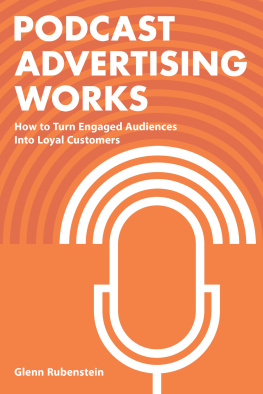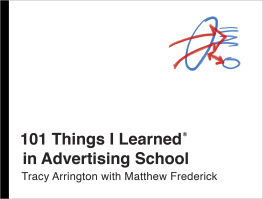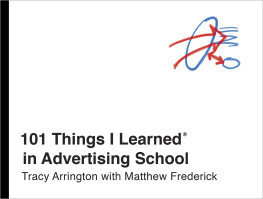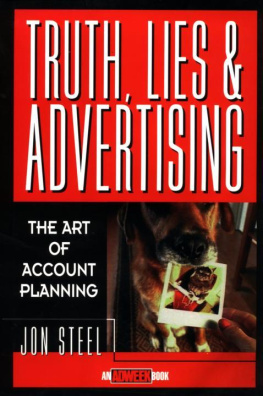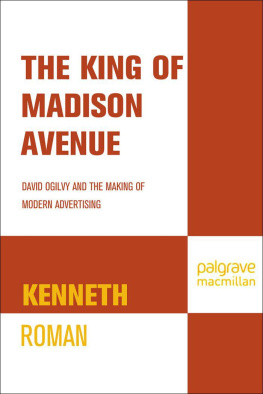Dont tell me how good you make it; tell me how good it makes me when I use it. Leo Burnett
Copyright 2020 by David Ullman
All rights reserved. No part of this book may be reproduced, stored in a retrieval system, or transmitted, in any form or by any means, without prior written consent from the publisher.
Cataloguing data are available from Library and Archives Canada
ISBN 978-1-77327-111-8 (pbk.)
ISBN 978-1-77327-113-2 (ebook)
ISBN 978-1-77327-112-5 (pdf)
Editing by Michael Leyne
Copy editing by Peter Norman
Proofreading by Breanne MacDonald
Distributed internationally by Publishers Group West
Figure 1 Publishing Inc.
Vancouver BC Canada
www.figure1publishing.com
1.
What the Hell Is Advertising, Anyway? *
I n the beginning...
Advertising probably began when one Neanderthal shouted to another that he had found a long pointy stick that would be great for hunting. He called it Long Pointy Stick. Then an Ad Neanderthal came along and counseled that it needed a new name something really cool, like Spear. And with a name like that you can sell it for at least four shells!
While historians figure that advertisingthe act or practice of calling public attention to ones product, service, need, according to Dictionary.commay have started in the late 1600 s, advertising as we know it really got going in the 1920 s. Since then the business of advertising has grown. A lot.
According to Statista, in 2018 nearly $ billion dollars U.S. was spent on advertising in North America. As best I can tell, there are better than , agencies in North America. The bottom line is that this is big business. Its an industry. And its becoming more complex every day. Indeed, every time theres an even minor advance in communications, the business of advertising tends to expand a bit as they put that minor advance to work to help sell stuff. Advertising is an industry that expands and grows just about //. These days, theres hardly a product or service that isnt advertised. All because somewhere, some ad person thinks, Hmmmm, I have an idea for you...
There are those who regard advertising as manipulative, convincing people that they should buy stuff they dont really need, things that wont improve their life. Others say that advertising helps stimulate an economy by helping to generate mass sales that keep the cost of goods and services reasonable. Either way, advertising has become an art, a science, and a source of entertainment. The most effective link between clients and their markets is advertising agencies and their clients. The difference between a Great Client and a bad client is what this book is all about.
* What advertising can and cant do
The claim is that advertising can sell a product. Any product. Anytime. Anywhere. All it takes is a decent ad in the right publication. Or a decent commercial on the right station at the right time. Or a decent direct mail piece delivered to the right people.
Heresy: My experience leads me to conclude that advertising really doesnt sell. I may fit the Range Rover demographic, the commercials are beautifully produced, and I see them when they interrupt the program Im watching. But they simply dont move me to think about a test-drive.
I also see a lot of automobile insurance company advertising. They all tell me how much Ill save and all I have to do is pick up the phone and dial this number and well give you a free money-saving quote in minutes!
We had one client that proves my point. It was/is a consumer direct company. And boy did I have discussions with that client. His position was that when sales of policies were down, it was the fault of the advertising. I disagreed.
No matter how many calls the work we did produced (and we often produced record numbers of calls), the client was steadfast in his thinking. He measured the effectiveness of the advertising by the actual number of policies sold. I maintained my position. (I am sure he still thinks he was right. I know I was right.)
I believe that the advertising did exactly what it was supposed to do: get people to call! Once that call was made, it was up to the person who answered the call to sell the policy. If that person had just had a fight with his wife or just received a notice that he was being sued, that person would not answer the phone and express a genuine interest in helping the caller get the right policy at a money-saving price.
Back to the Range Rover example. Even if I were motivated to test-drive a Range Rover, its the salesman at the dealership wholl sell me the car. Or not. If the advertising is successful, it will move people to take a test-drive. Frankly, I doubt watching a new model climb a massive staircase in China will move people to arrange for a test-drive. On the other hand, it may fall into the category called brand building. And that aint too bad.
I suppose the real point here is that the job of advertising is to move the consumer to do somethingpick up the phone and call, look for products or find out where the product is sold, try a tankful of performance-improving gasoline or try that special toothpaste thatll brighten their smile.
Advertising can educate, inform, introduce, and create an impression and a climate for salesmen and women. It can make you want a beer while watching a football game, or make you hungry for a pizza, or make you want to try a nice place to dine or travel to, and so on. But close the deal? I dont think so.
* People make one agency different from another
An advertising agency is a group of sharply focused people helping you build your business. They do what other businesses dont do, or dont do well. The agency product is specialized know-how from people with talents for writing and visualizing. As such, an agency will provide the client with all the folks in all the supporting services needed by the client in order to help their business grow: account management, media planning, buying and traffic, production (print and broadcast), and just about any kind of research and creative: copywriting, art direction, photography, television production, print production, online content... you name it.
Think of an agency as if it were a Ferrari. When you peek under the hood there are a lot of moving parts at work. Great Clients know whats connected to what; when they hear a weird squeaking sound, they can tell where its coming from and what it means. And then theyand agency managementdo what they can to ensure that the engine continues to run smoothly. In short: The parts of any advertising agency are its people. Men and women whose daily contributions make sure the engine runs smoothly and can get the clients business to where it wants to be.
* What makes an agency client a Great Client?
When I landed with BBDO , an agency with plenty of experience with Great Clients, my first assignment was to work with the Armstrong Cork account. Now, get this:In 1918 , the Armstrong Cork Company signed the Batten Company to handle its advertising. Today, Armstrong is Armstrong Worldwide Industries, and the Batten Company is known as BBDO . Armstrong is still their client. These guys are doing something right!
In retrospect I can honestly say that every client I worked with received nothing less than pro service and work we honestly believed would help them reach their goals. But it seemed that the work with an extra spark or two of creativity was done for clients that actually made us part of their team and appreciated the efforts being made on their behalf.
Shortly after I joined BBDO / NY , the fellow who had been handling the creative work for Remington Arms retired. I was asked if I could work with a sporting firearms account. I said, Let me go talk with them.

